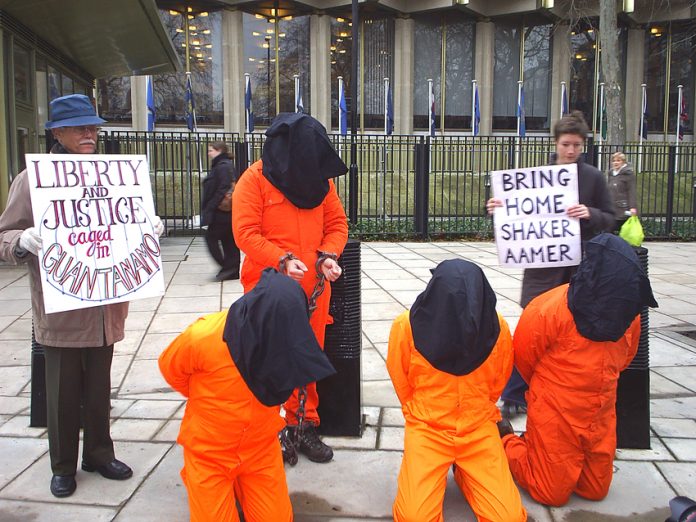ON WEDNESDAY, July 11, lawyers representing eight long-term detainees at Guantánamo Bay argued in federal court that the US government cannot continue to detain the prisoners there forever, immune to judicial review.
The mass habeas corpus motion, filed on the men’s behalf by Reprieve, the Center for Constitutional Rights (CCR) and other counsel, argues that their indefinite detention, based on President Donald Trump’s proclamation that he will not release anyone from Guantánamo, is arbitrary and unlawful.
The literal translation of habeas corpus is ‘you hold the body’ – and the government must prove that is legal. None of the men has been charged with a crime. The Trump administration’s lawyers claim their detention is not indefinite – which would violate the US Constitution as well as international law – but ‘indeterminate’, a semantic distinction that lawyers for the men challenged in court today.
At one point, Judge Thomas Hogan asked US Justice Department attorney Ronald Wiltsie whether the US government’s legal justification for detaining the men, based on the Authorization for the Use of Military Force, would allow them to be imprisoned for 116 years – the duration of the Hundred Years’ War between England and France.
‘Yes,’ Wiltsie replied. ‘We are still engaged with the same battle foes in the same battle space.’ In a war without end, the men are perpetually detained. Reprieve represents four of the petitioners, including two men, Towfiq al Bihani and Abdullatif Nasser, who have been cleared for transfer by US defence and security agencies, but remain imprisoned, apparently with no hope of being released.
Shelby Sullivan-Bennis, who acts as legal counsel for Reprieve’s seven Guantánamo clients, including Bihani and Nasser, said: ‘Keeping these men behind bars forever, when the government’s own investigators have determined that they committed no crime and pose no threat, is a shocking violation of the USA’s founding principles.
‘Guantánamo Bay is a global symbol of injustice, and a recruitment tool for America’s enemies.
‘It has made us less safe, at huge expense to taxpayers, while doing lasting damage to the USA’s reputation as a beacon for fairness and liberty.’
CCR’s legal director, Baher Azmy, argued the case in court on Wednesday. He said: ‘Our dangerous experiment in indefinite detention, after sixteen years, has run its course.
‘Due process of law does not permit the arbitrary detention of individuals, particularly at the hands of a president like Donald Trump, who has pledged to prevent any releases from Guantánamo.’
Reprieve client Abdulmalik Bajabu is also among the petitioners. He has been held without trial at Guantánamo Bay since 2007. In his last phone call with Shelby Sullivan-Bennis, he expressed hope that he will eventually be released.
Bajabu said: ‘In Guantánamo there are not any rights. Might is right. ‘The administration has power and you can do nothing. But people in America are good people – they don’t know what is going on in GTMO. ‘I don’t lose heart, no matter what will come. I don’t know if I’ll wake up tomorrow, so I try to live for each day.
‘We are all still praying but to be free is to be free in your heart. After all, people out there who have cancer suffer too, but try to make the most of their lives. ‘Still, if the judge truly took an oath to do what is right then he will do what is right.’
As arguments began in the case of Toffiq al-Bihani and ten others seeking release from arbitrary detention in Guantanamo Bay, Amnesty International reiterated its call for their release and the closure of the facility. Daphne Eviatar, Amnesty International USA’s Director of Security with Human Rights, said: ‘Toffiq al-Bihani’s case highlights how the United States continues to employ arbitrary imprisonment, while offering impunity to those responsible for torture.’
Al-Bihani is a 46-year-old Yemeni citizen, born and raised in Saudi Arabia, who has been held in Guantanamo since February 6, 2003. He was arrested 17 years ago by Iranian police, transferred to Afghan custody until he was turned over to US custody in Afghanistan. According to the 2014 Senate report on the CIA torture programme, he was subjected to torture while in US custody. He was eventually transferred to Guantanamo Bay in early 2003.
On January 22, 2010, US authorities determined that al-Bihani could be transferred to Yemen if the security situation improves there, or to a third country. Saudi Arabia, where al-Bihani has eleven brothers and sisters, has agreed to accept him.
Yet he remains imprisoned today, eight years after being approved for transfer. Al-Bihani is one of forty men who remain imprisoned after being deprived of due process and fair trials for well over a decade – men that have suffered both the physical and psychological consequences of indefinite detention and torture in Guantanamo.
• A Nevada judge blocked Wednesday night’s scheduled execution of Scott Dozier by ruling that the state may not use the sedative midazolam as part of its lethal injection protocol. The American pharmaceutical company Alvogen had sued Nevada to prevent the use of its medicines in the execution.
Judge Elizabeth Gonzalez decided in the company’s favour. Her ruling said: ‘The state is restrained and enjoined from using midazolam.’ As the state has said it will not proceed with the execution without its three drug protocol, the execution was effectively blocked.
